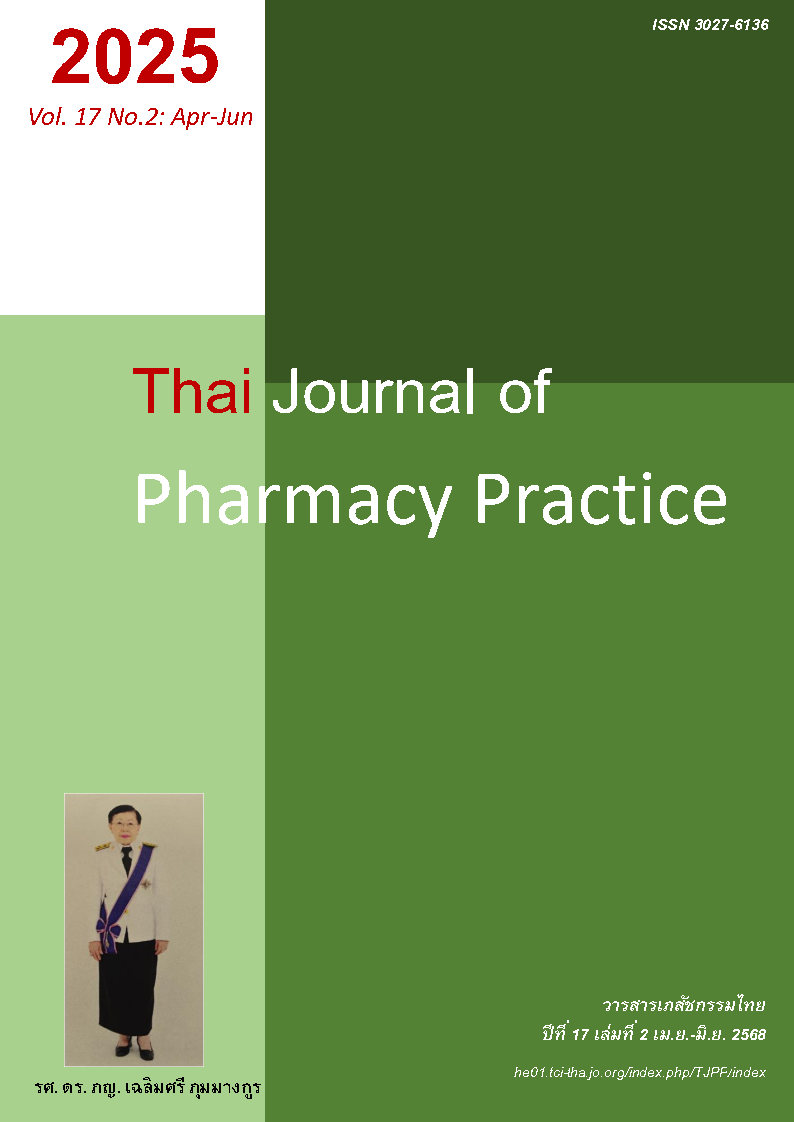Prevalence and Factors Associated with Parents' Refusal to Vaccinate Their Children Aged 5 to less than 18 Years against COVID-19 in Nonthaburi Province
Main Article Content
Abstract
Objective: To identify the prevalence and study factors affecting parents' refusal to vaccinate their children against COVID-19. Method: This research was a cross-sectional descriptive study. Data were collected from
October 1st to December 31st, 2022. The subjects consisted of 440 biological parents of children aged 5 to less than 18 years living in the catchment areas of 12 sub-district health promoting hospitals located in Nonthaburi Province. Village health volunteers collected the data using a self-administered questionnaire. Results: Most of the research participants were mothers (65.9%). The prevalence of parents refusing to vaccinate their children against COVID-19 was 24.5%. The study identified 5 factors related to parents’ refusing to have their children vaccinated against COVID-19
as follows; 1) Vaccination decision makers: mothers refused the vaccination for their children more than fathers
(adjusted OR = 1.87; 95% CI: 1.07-3.29; P=0.029); 2) Education level: parents with education lower than
bachelor's degree refused to have their children vaccinated more than those with a bachelor's degree or higher
(adjusted OR = 8.8; 95% CI: 3.77-20.53; P<0.001); 3) History of COVID-19 vaccination among parents; parents who had never been vaccinated against COVID-19 refused to have their children vaccinated more than parents with history of such vaccination (adjusted OR = 2.93; 95% CI: 1.51-5.72; P=0.002); 4) Being aware of the risk of child being infected in school: parents who were unaware of the risk of their children being infected in school refused to have their children vaccinated more than those with such awareness on the risk (adjusted OR = 4.08; 95% CI: 2.31-7.21; P<0.001); and
5) Children’s resistance to vaccination: parents whose children resisted the vaccination were more likely to refuse to have their children vaccinated more than those whose children did not resisted (adjusted OR = 5.53; 95% CI: 3.21-9.52; P<0.001) Conclusion: Factors associated with parents refusing to vaccinate their children against COVID-19 may hinder the effort to strengthen herd immunity in children. Those involved should find the measures to reduce those barriers
in order to gain more acceptance of vaccination for children among parents leading to herd immunity among children against COVID-19.
Article Details

This work is licensed under a Creative Commons Attribution-NonCommercial-NoDerivatives 4.0 International License.
ผลการวิจัยและความคิดเห็นที่ปรากฏในบทความถือเป็นความคิดเห็นและอยู่ในความรับผิดชอบของผู้นิพนธ์ มิใช่ความเห็นหรือความรับผิดชอบของกองบรรณาธิการ หรือคณะเภสัชศาสตร์ มหาวิทยาลัยสงขลานครินทร์ ทั้งนี้ไม่รวมความผิดพลาดอันเกิดจากการพิมพ์ บทความที่ได้รับการเผยแพร่โดยวารสารเภสัชกรรมไทยถือเป็นสิทธิ์ของวารสารฯ
References
Singla R, Mishra A, Joshi R, Jha S, Sharma R, Upadhyay S, et al. Human animal interface of SARS-CoV-2 (COVID-19) transmission: a critical appraisal of scientific evidence. Vet Res Commun 2020; 44: 119-30.
World Health Organization. WHO Coronavirus (COVID-19) dashboard [online]. 2022 [cited Jun 18, 2022]. Available from: covid19.who.int
The Royal College Pediatricians of Thailand. Covid-19 situation among children (aged 0-18 years) in Thailand from April 1, 2021 - December 29, 2021 (Weeks 15-53) [online]. 2022 [cited Jun 30, 2022]. Available from: www.thaipediatrics.org/?p=2539
The Royal College Pediatricians of Thailand. COVID-19 Interim guidance management of children with COVID-19 (Issue 1/2022) [online]. 2022 [cited Jun 29, 2022]. Available from: www. thaipediatrics.org /?p=1222
Amin UA, Parveen AP. Impact of COVID-19 on children. Middle East Curr Psychiatry. 2022; 29: 94. doi.org/10.1186/s43045-022-00256-3
Feldstein LR, Tenforde MW, Friedman KG, Newham M, Rose EB, Dapul H, et al. Characteristics and outcomes of US children and adolescents with multisystem inflammatory syndrome in children (MIS-C) compared with severe acute COVID-19. JAMA. 2021; 325: 1074-87.
The Royal College Pediatricians of Thailand. Recom mendations for vaccination against COVID-19 for children and adolescents (Issue 4) [online]. 2022 [cited Jul 2, 2022]. Available from: www.thaipedia trics.org/?p=1015
Ashby B, Best A. Herd immunity. Curr Biol 2021; 31: R174-R177.
World Health Organization. Coronavirus disease (COVID-19) questions and answers on Herd immunity, lockdowns and COVID-19 [online]. 2020 [cited May 3, 2022]. Available from: www.who.int/thai land/emergencies/novel-coronavirus-2019/q-a-on-co vid-19/q-a-on-covid-19-herd-immunity-lockdowns-an d-covid-19
Archananupap S. Herd immunity. Morchawban 2021; 507: 19-20.
The Bureau of Registration Administration. Official statistics registration systems [online]. 2022 [cited May 3, 2022]. Available from: stat.bora.dopa.go.th/ stat/statnew/statMONTH/statmonth/#/displayData
Nonthaburi Provincial Public Health Office. Sum- mary of COVID-19 vaccinations Nonthaburi province as of June 17, 2022 [online]. 2022 [cited June 18, 2022]. Available from: m.facebook.com/story.php? story_fbid=pfbid0bYaqHyqzprGhUEcYu5GYT1ztTHCp3Upsw9LKJ9bTRPR81gr9mqJqWx2LfL5SBeykl&id=723209481&mibextid=Nif5oz
Al-Metwali BZ, Al-Jumaili AA, Al-Alag ZA, Sorof- man B. Exploring the acceptance of COVID-19 vaccine among healthcare workers and general population using health belief model. J Eval Clin Pract 2021; 27: 1112-22.
Panchalingam T, Shi Y. Parental refusal and hesitancy of vaccinating children against COVID-19: findings from a nationally representative sample of parents in the U.S. Prev Med. 2022; 164: 107288. doi: 10.1016/j.ypmed.2022.107288.
Maneesriwongul W, Butsing N, Deesamer S. Parental hesitancy on COVID-19 vaccination for children under five years in Thailand: role of attitudes and vaccine literacy. Patient Prefer Adherence 2023; 17: 615-28.
Dhand NK, Khatkar MS. Statulator: An online statistical calculator: sample size calculator for estimating a single proportion [online]. 2014 [cited Apr 27, 2022]. Available from: statulator.com/Sample Size/ ss1P.html.
Health Serve. List of subdistrict health promoting hospitals in Nonthaburi Province [online]. 2023 [cited Nov 15, 2023]. Available from: healthserv.net/hospi talnews/1894
Yadav AK, Kumar S, Singh G, Kansara NK. Demysti fying r naught: understanding what does it hide?
Indian J Community Med 2021; 46: 7-14.
Minkin R, Horowitz J. Mental health concerns top the list of worries for parents; most say being a parent is harder than they expected [online]. 2023 [cited Oct 4, 2022]. Available from: www.pewre search.org/social-trends/2023/01/24/parenting-in-am erica-today/
Almalki OS, Alfayez OM, Yami M, Asiri YA, Almo hammed OA. Parents' hesitancy to vaccinate their 5-11 years old children against COVID-19 in Saudi Arabia: predictors from the health belief model. Front Public Health. 2022; 10: 842-62.
Voo JYH, Lean QY, Ming LC, Md Hanafiah NH, Al-Worafi YM, Ibrahim B. Vaccine knowledge, aware- ness and hesitancy: a cross sectional survey among parents residing at Sandakan District, Sabah. Vaccines (Basel) 2021; 9: 1348. doi:10.3390/vaccine s9111348.
Lertpakornteeratat P. Attitudes of employees toward working with different age groups of worker population in Bangkok metropolis [online]. 2019 [cited Oct 1, 2023]. Available from: mmm.ru.ac.th/ MMM/IS/twin-7/6114152039.pdf


